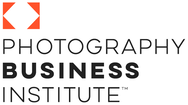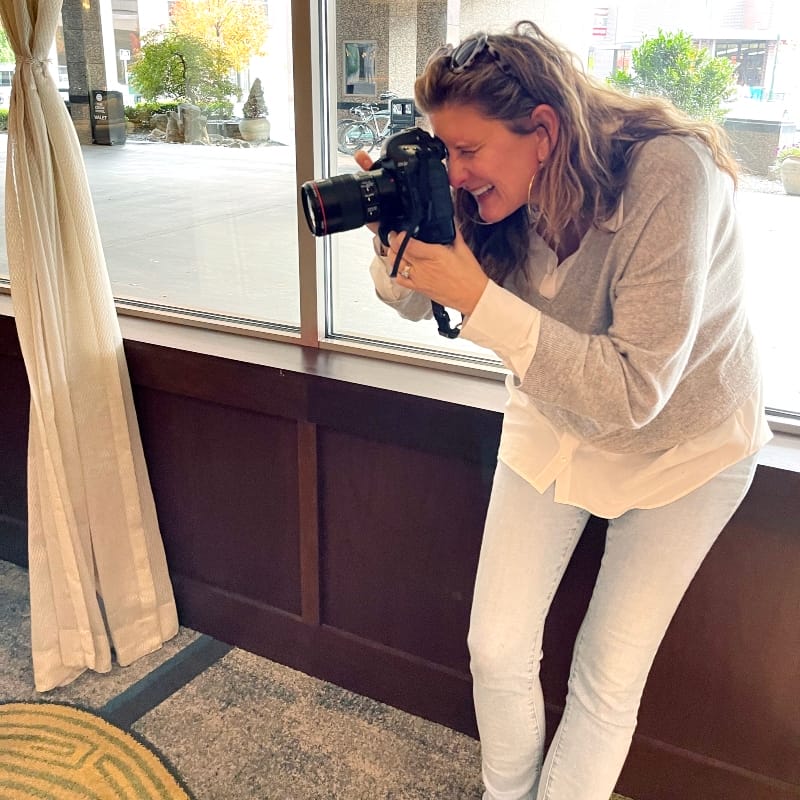Are you wondering how to price your photography so that you can actually take home a paycheck from all the work you’re doing?
…Especially when you already hear from potential clients that “you’re too expensive.”
You know you want to make more money from your photography, but if clients already think you’re too expensive how is that possible?
Well the problem may not be that your prices are too high.
In fact, if you’re like most photographers whose numbers I dig into, your photography pricing is probably too low because you aren’t accounting for all of your time or your expenses.
But before your eyes glaze over, this is not a blog post about the math side of how to price photography.
Instead, we’re talking about what happens AFTER you set profitable prices to get clients to pay them!
I suspect that what is happening when potential clients say you’re too expensive is that you’re not presenting your prices in a way that leaves potential clients thinking you’re worth it.
There’s a lot of psychology that goes into showing clients that you’re worth the prices you are charging for your photography.
So how can you present your prices differently?
Here are 5 Photography Price List Tips every portrait photographer can use:
1. Start With the Biggest
When building your photography price list, your highest priced products should always appear first.
Afraid your biggest packages will scare off your clients? Don’t be!
What this price list tip does is anchor your services to a high price point in your clients’ minds. So when they look down your price list to see the prices of your smaller photography products, these prices seem even smaller in comparison to your largest products.
Think of it this way. We nearly always have a price in mind for what we think something should cost.
For a haircut, you may expect to pay $40. So when you visit a new stylist and see that the first haircut listed on her price list costs $120, your first thought is probably WOW…this is WAY out of my price range.
As you read down the list of services, you notice that the $120 cut is the deluxe service that also includes a conditioning mask, 30 minute head massage and blow out.
Now, below the deluxe service, you see a cut without those services is a much more affordable $60.
Sure $60 is more than what you are used to paying for a haircut, but it feels a lot more affordable because the first price you saw on the price menu was $120.
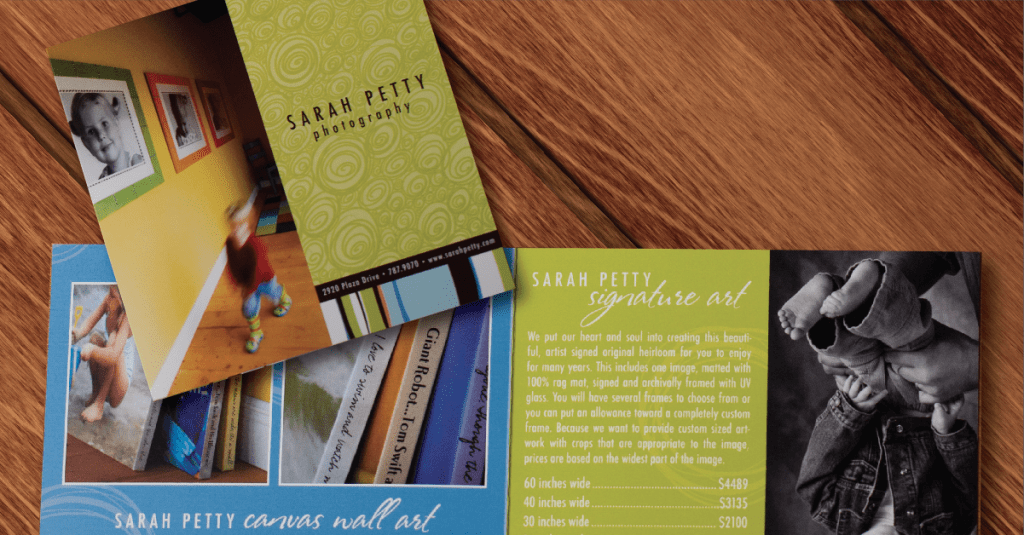
Make sure you list your highest-priced products first when you’re creating your photography pricing menu.
2. Get Visual
People buy what they can see.
So instead of printing your photography price list from your printer on an 8.5” x 11” sheet of paper that looks like a restaurant menu with words and prices only, get visual.
Your price menu should include images of your photography products next to the prices and descriptions.
Not only does this take the emphasis off the prices themselves, but it gives you and your clients a conversation piece. And when your prices don’t look like they came off your printer this morning, it makes your pricing more official and sets the tone that these prices are non-negotiable.
I print my price menus in quantities of 25 at whcc for less than a few dollars each.
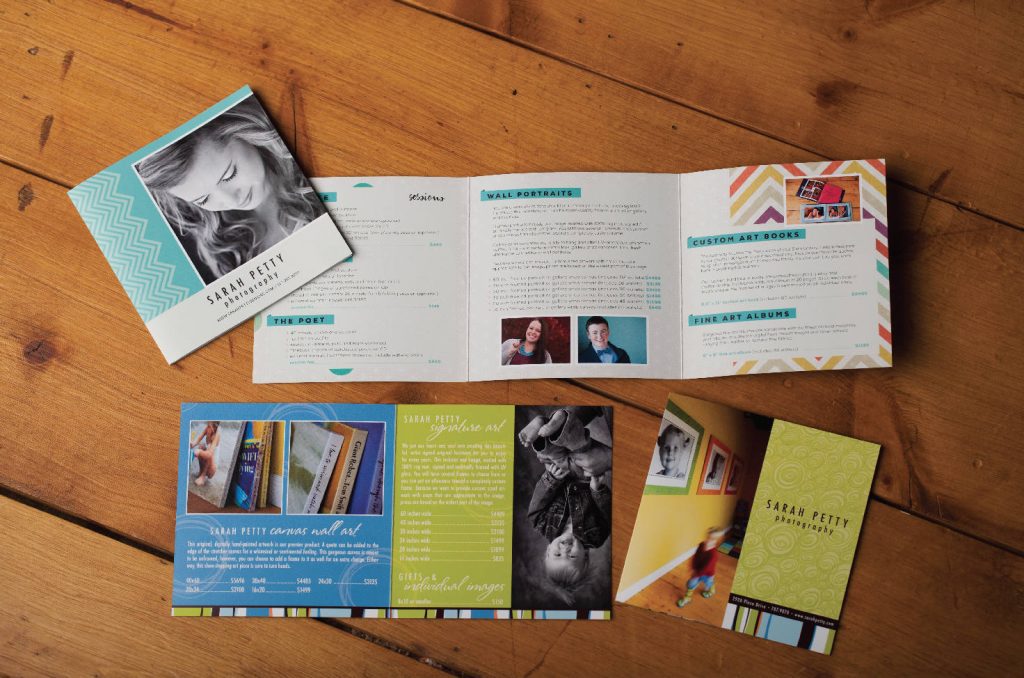
When creating your photography price list, make sure to include images of your photography products next to the prices and descriptions.
3. Take the Extras Away
Which price looks like it costs more?
$1,499 or $1,499.00?
Studies have shown when you remove the decimal point and unnecessary zeros, your prices appear smaller to your customers!
Despite being the exact same price, our brains tell us that when there are more numbers in the price, it’s a more expensive purchase.
Drop the extra zeros and the decimal point on your photography price list. It may be hurting you.

Do you have extra zeros and the decimal point on your photography price list? It may be hurting you.
4. Be an Odd Ball
Clients tend to perceive prices ending in odd numbers ($799) as being significantly lower than they actually are.
One theory is that our brains are looking for shortcuts and can only store so much information. When we see the number $799, our brain quickly rounds to the next lowest number, in this case $700, rather than rounding up to the higher price point, $800.
Instead of pricing your creation fee at $200, try setting it at $199. Instead of pricing your 8” x 10” print at $150, try pricing it at $149.
You’re probably experiencing this pricing strategy every day as you shop, too.
There are many studies about this effect and how it relates to pricing, if you’re interested in learning more.

Are you pricing your photography products so they end in odd numbers? Clients perceive odd-ending prices as being significantly lower than they actually are.
5. Create a Product You Don’t Want to Sell
What?! You only have so much room on your photography price list, right?
But like I mentioned in How to Price Your Photography Tip #1, when you anchor a high price for your services in your clients’ minds, your other products appear a LOT more affordable.
The product you don’t want to sell should be a product that positions you as completely different than your competitors.
At Sarah Petty Photography, I offer custom, hand painted frames like the one below.
While 99% of my clients don’t choose this option, this product positions me as more creative than my competition and anchors my value as an artist to a higher price point in my clients’ eyes.
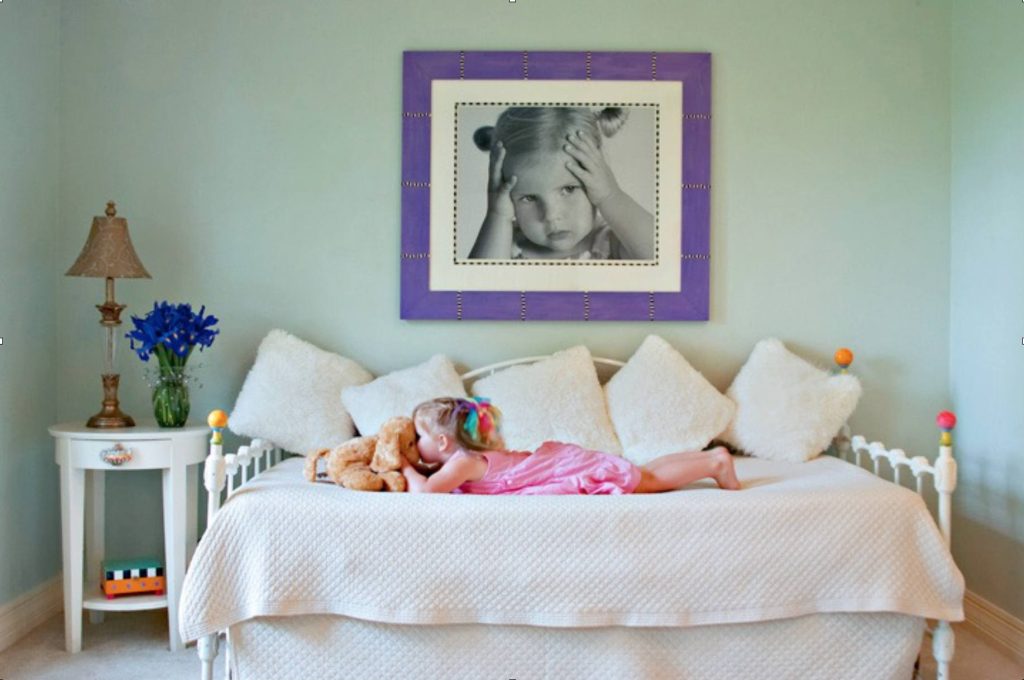
Offering a product that you don’t want to sell allows you to price your photography higher than your competitors.
Which of these photography pricing tips have you tried on your price list?
Which are your favorite?
Share your favorite pricing tips in the comments below.
